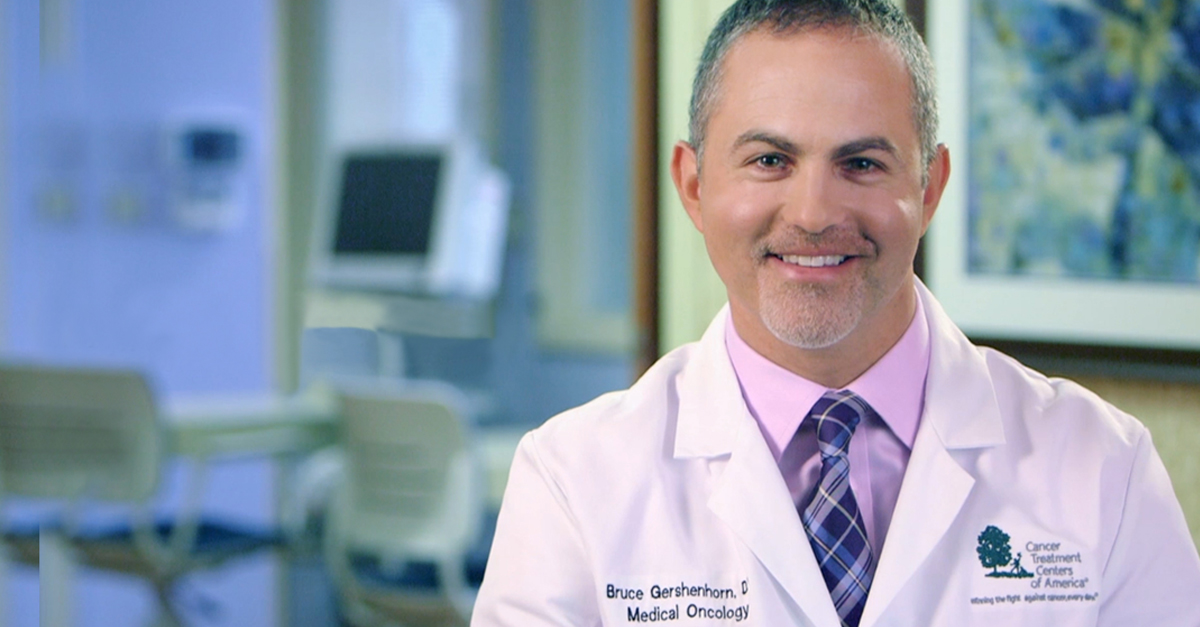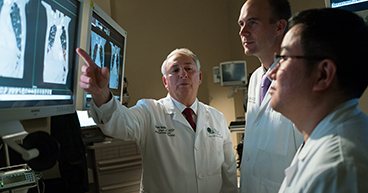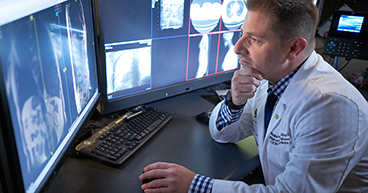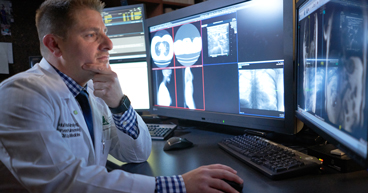
Bruce Gershenhorn, DO, Director of the Lung Center at our hospital in Suburban Chicago, took time out of his schedule to answer your questions on lung cancer. Lung cancer is the second most common non-skin cancer among American men and women, and we know there are many questions about the disease, from how it develops to how it’s treated.
We’ve summarized below some of the conversations that took place recently on the Cancer Treatment Centers of America® (CTCA) Facebook page.
Q: Cancer runs in my family. How can I get checked? – Alexander
A: Lung cancer commonly occurs due to environmental exposures and lifestyle habits, such as cigarette smoking. In rare instances, lung cancer runs in families, and there is no genetic test currently available to screen for the disease. I would recommend you discuss your concerns with your doctor.
Q: How do you treat renal cell carcinoma in the lungs? – Edna
A: Advanced cancers require a comprehensive evaluation from a medical oncologist and may benefit from a second opinion. Because of so many variables, a specific recommendation is difficult to provide.
Chemotherapy
Q: After chemotherapy, when will my energy come back? It’s been over a year. – Terri
A: Energy levels typically recover to near normal one to two months after chemotherapy has been completed. I would recommend you see your doctor to determine whether other possible causes may be involved, and to help manage your fatigue.
Q: After chemotherapy, when will my hair grow back? – Karen
A: Hair regrowth typically begins within one month after stopping chemotherapy.
Q: I am in remission! But I was told I have a very high risk of getting cancer again. Is this possible? – Jen
A: First, congratulations on your remission! Unfortunately, cancers may sometimes recur. I would recommend that you follow up with your doctor. Close surveillance is strongly recommended if your recurrence rate is high.
Q: Can cancer cells survive in an alkaline body? – Susie
A: The average body’s pH level is 7.4, and it does not typically waiver. Introducing acidic or alkaline foods to the body cannot create a true alkaline state because the blood’s pH cannot be changed.
Metastasized renal cell kidney cancer
Q: How would you treat renal cell kidney cancer that has metastasized to the lungs in a hilar mass? – Kaye
A: There is no one-size-fits-all approach to cancer. Many advances have been made in managing kidney cancer, and a comprehensive evaluation of your situation is warranted before an appropriate recommendation can be offered.
Q: What’s the difference between small cell and non-small cell? – Chelsea
A: The origin of the cancer cell is different from one cancer type to the next. Both small cell and non-small cell cancers frequently originate in the lungs, but the cells' behavior, spreading pattern and response to treatment may vary. Individualized treatments must be strongly considered and evaluated so that an appropriate care plan may be tailored your needs.
Q: What are your survival rates for small cell lung cancer? – Lee
A: With new treatment options and the advent of immunotherapies, my hope is survival statistics will continue to dramatically improve in the future.
Q: Can losing your voice or not reaching higher notes indicate lung issues? – Theresa
A: Hoarseness is typically related to changes in vocal cord function. I would recommend an evaluation with an ear, nose and throat physician.
Q: I am planning a CT scan with my local hospital. They said it is a low dose. What is that? – Barbara
A: Lung cancer screening with a low-dose CT scan is now standard of care for people who are older than 55, have a 30-year pack history of smoking and who are currently smoking, or who quit less than 15 years ago. I am a big proponent of lung cancer screening because studies suggest it decreases mortality by 20 percent.
Early signs of lung cancer
Q: What are the early signs of lung cancer? – Rita
A: A persistent cough, coughing up blood, shortness of breath, chest pain and weight loss are common symptoms of lung cancer.
Q: I have a history of cancer in my maternal parents and grandparents. Am I eligible for genetic cancer screening? – Patricia
A: Ideally, the members of your family who had cancers (breast, ovarian, colon or endometrial) should be tested for genetic predisposition syndromes. If they have one, then it would be appropriate for you to be tested.
Q: I had stage 1 lung cancer, a lobectomy and no chemotherapy or radiation follow-up. Should I have had follow-up treatments? – Deborah
A: Generally, we routinely follow up with patients with stage 1 lung cancer with CT scans and clinical assessments.
Does COPD mean I have lung cancer?
Q: I have COPD and have a problem standing on my feet for longer than 10 minutes. Could this be sign of lung cancer? – Rita
A: I recommend an evaluation of your back pain with your primary care physician and regular follow up with your pulmonologist for your COPD.
Q: What causes adenocarcinoma? – Julia
A: In lung adenocarcinomas, the predominant risk factor is cigarette smoking.
This information is not intended nor implied to be a substitute for professional medical advice. Always seek the advice of your physician or other qualified health provider prior to making decisions about your treatment.



